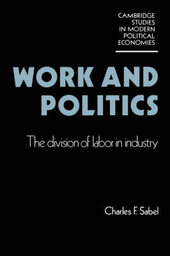
|
Work and Politics: The Division of Labour in Industry
Paperback / softback
Main Details
| Title |
Work and Politics: The Division of Labour in Industry
|
| Authors and Contributors |
By (author) Charles F. Sabel
|
| Series | Cambridge Studies in Modern Political Economies |
|---|
| Physical Properties |
| Format:Paperback / softback | | Pages:320 | | Dimensions(mm): Height 228,Width 152 |
|
| Category/Genre | Political economy |
|---|
| ISBN/Barcode |
9780521319096
|
| Classifications | Dewey:306.36 |
|---|
| Audience | | Professional & Vocational | |
|---|
| Illustrations |
Worked examples or Exercises
|
|
Publishing Details |
| Publisher |
Cambridge University Press
|
| Imprint |
Cambridge University Press
|
| Publication Date |
27 April 1984 |
| Publication Country |
United Kingdom
|
Description
Work and Politics develops a historical and comparative sociology of workplace relations in industrial capitalist societies. Professor Sabel argues that the system of mass production using specialized machines and mostly unskilled workers was the result of the distribution of power and wealth in eighteenth- and nineteenth-century Great Britain and the United States, not of an inexorable logic of technological advance. Once in place, this system created the need for workers with systematically different ideas about the acquisition of skill and the desirability of long-term employment. Professor Sabel shows how capitalists have played on naturally existing division in the workforce in order to match workers with diverse ambitions to jobs in different parts of the labor market. But he also demonstrates the limits, different from work group to work group, of these forms of collaboration.
Reviews'Work and Politics is an imaginative and suggestive look at contemporary Western European and U.S. industrialism, with occasional historical digressions ... Sabel argues that different types of workers approach employment not only with different skills and habits but with different expectations and desires as well. Using a wide range of examples - petrochemical workers in Germany and Britain, auto workers in Turin and Hamtramck - Sabel portrays the social personalities of each major subgroup within the working class, from common laborers to workers with plant-specific skills to craftsmen with generalized problem-solving abilities.' The Nation 'Sabel's main contributions are demonstrations that simple pluralistic and class models of work politics are inadequate, that economic structures are influenced politically, and that relations among working class strata centrally explain collective behavior. Sabel's firm grasp of the French, German, and Italian literature is also impressive.' Contemporary Sociology
|